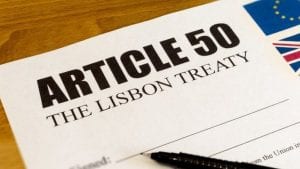By Prof Phil Syrpis, Professor of EU Law (University of Bristol Law School).
On Monday 4 December 2017, we reached what may prove to be a key staging post on the long, and winding, road which may or may not be leading us towards Brexit. Progress to phase 2 of the withdrawal negotiations, in which the UK and EU will be able to begin to discuss their future relationship, is, as stipulated by the EU and agreed by the UK Government, dependent on ‘sufficient progress’ in relation to the divorce bill, citizens’ rights, and Ireland. The clock towards March 2019 is ticking.
By Monday morning, it appeared that a methodology for calculating the divorce bill had been agreed, and that sufficient guarantees relating to the protection of citizens’ rights had been offered (though it should be noted that various difficult issues, including in relation to the future role of the CJEU, appear to have been left to phase 2). It was also reported that an agreement had been reached that there was ‘to be no divergence from those rules of the internal market and the customs union, which now or in the future, support North South cooperation and the future of the Good Friday Agreement’, a form of words which appears to have been agreed in Brussels, Dublin and London. Reading that, it is not clear whether the leaked agreement contemplated harmonisation between the EU (including Ireland) and Northern Ireland specifically; or between the EU (including Ireland) and the UK as a whole.
Enter the DUP. Arlene Foster made it clear that the DUP would not accept ‘any form of regulatory divergence which separates Northern Ireland economically or politically from the rest of the United Kingdom’. Suddenly, the deal was off. Had the UK been agreeing to a lack of divergence between Ireland and the UK as a whole, the DUP’s concern would not have resonated. It is only possible to conclude that, in order to allow the withdrawal negotiations to move forward, the UK Government was contemplating a regime in which divergence within the island of Ireland was to be managed, while the rest of the UK retained the freedom to distance itself more sharply from EU (including Irish) rules. A chorus of voices, from Scotland, Wales and London (and also, I believe, Grimsby), predictably rose to demand an equivalent right to similar special treatment, seeking to protect their own special relationships with the EU. We wait to see how the Government will react.
This short contribution aims to illustrate that there are now hard questions for the Government to confront. If Ireland is in the single market and customs union and Northern Ireland is not, there will need to be a border on the island of Ireland, and, as Anand Menon wrote yesterday, any increase in regulatory divergence in Ireland would impact significantly on people’s lives there (he references health care, agriculture, transport, and energy). If the island of Ireland is to remain in the single market and customs union (or, and I will come back to this shortly, be the subject of an equivalent arrangement ensuring continued regulatory alignment) and the rest of the UK is not, there will need to be a border across the Irish Sea. (more…)
 This blog is written after the European Council conclusions were agreed yesterday, on 21 March, on the assumption, which is widely shared, that the EU’s extension plan is accepted by the UK. It is in two parts. In the first, I explain the nature of the choices ahead. In the second, I seek to make a positive case for revoking the A50 notification.
This blog is written after the European Council conclusions were agreed yesterday, on 21 March, on the assumption, which is widely shared, that the EU’s extension plan is accepted by the UK. It is in two parts. In the first, I explain the nature of the choices ahead. In the second, I seek to make a positive case for revoking the A50 notification.






